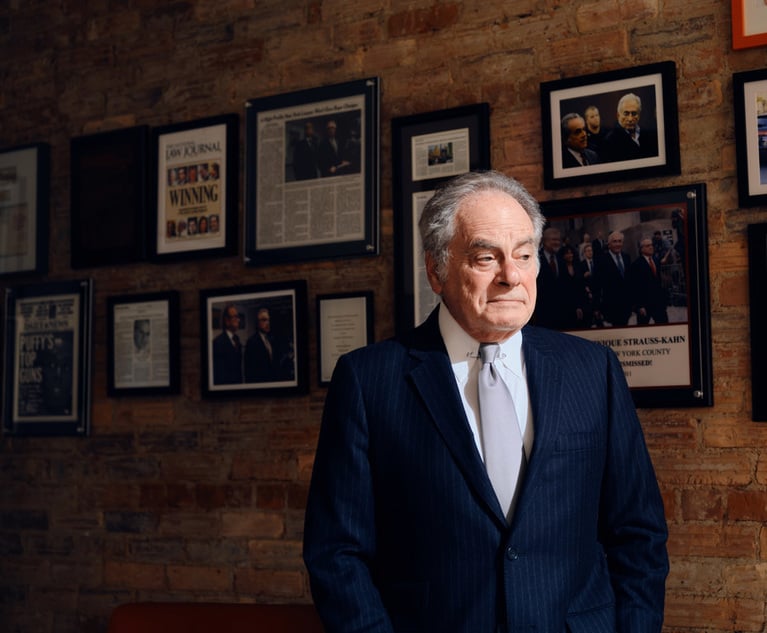Litigator of the Week: Ted Olson Hits the Jackpot
After a long losing streak in the lower courts, Gibson, Dunn & Crutcher partner Theodore Olson's luck changed before the Supreme Court, which sided with him in a seismic sports-betting case.
May 18, 2018 at 12:00 PM
5 minute read
The original version of this story was published on Litigation Daily

Even legal giants face setbacks, and for Gibson, Dunn & Crutcher partner Theodore Olson, who successfully argued the seismic sports-betting case before the U.S. Supreme Court this term, that meant first having to overcome “six or seven” losses in the lower courts.
So when the justices on Monday sided with him 6-3 (or 7-2, depending on how you tally it) and struck down a 1992 federal law prohibiting most states from licensing sports betting, it was a sweet win—and one with monster, market-moving implications.
But the victory came after years of dizzying, and for Olson, mostly disappointing litigation. Since sports leagues first brought a lawsuit six years ago against then-New Jersey Governor Chris Christie, the case, Murphy v. N.C.A.A., has ping-ponged around the courts. And Olson's client lost at virtually every turn.
“You can't help but get a little discouraged,” said Olson, who has argued and won some of the most important and polemical cases of our time, including Bush v. Gore, Citizens' United v. FEC, and the same-sex marriage fight, Hollingsworth v. Perry. “But we felt it was the right case.”
When the Supreme Court agreed to hear the case—brushing aside the Office of the Solicitor General's recommendation against doing so, and after the U.S. Court of Appeals for the Third Circuit sided with the sports organizations and against New Jersey—Olson passed around a song to colleagues and clients: “Still Not Dead,” by Willie Nelson.
“I felt like quoting this Willie Nelson song,” he said. “We felt we were not dead yet. As long as we were alive and still fighting we might win at the end of the day, which we did.”
Either way, he said he was “fascinated” from the beginning of the case.
It was also in some ways a natural fit—Olson's legal reputation is known among sports stars. For example, he represented New England Patriots star quarterback Tom Brady during Deflate-gate.
But in this case, the weight of the National Football League and most major sports leagues fell against him.
Olson first got involved when then-governor Christie called Gibson Dunn partner Debra Yang, an old friend. He told her he was interested in bringing on Olson, who served as solicitor general under President George W. Bush, to challenge the constitutionality of the Professional and Amateur Sports Protection Act of 1992, which prohibited state-sanctioned sports gambling.
“To have an opportunity to involve myself in a case like this where it seemed obvious to me from the beginning, that Congress had decided to do something in a way that was inconsistent with the federalism structure,” Olson said, “I thought it was a great, classic challenge to the way of doing things that Congress was not permitted to indulge in.”
According to the American Gaming Association, Americans illegally bet at least $140 billion on sports each year.
In 2012, and again in 2014, New Jersey moved to allow such gambling. In response, the National Collegiate Athletic Association and three major sports leagues sued to block the move, arguing that it violated the two decade-old sports betting law.
The sports leagues hired another legal superstar: Kirkland & Ellis partner and former U.S. Solicitor General Paul Clement, who just happens to also be Olson's mentee and good friend. Olson describes him as “as good as it gets anywhere.”
(So impressive was the matchup, The Lit Daily previously compared it to the Floyd Mayweather-Manny Pacquiao brawl.)
Olson recalled that he and Clement were both in Philadelphia arguing the constitutionality of the sports wagering law on the final day of the Supreme Court 2013 term, when Hollingsworth, the pivotal same-sex marriage decision, came down.
“Just about the time we started our argument, we got the decision from the Supreme Court,” Olson said, calling it “a very unusual moment.”
“It was exciting and exhilarating, but it was also distracting,” he said. “You know, you have to keep your mind on the case that you're actually arguing.”
Because Olson and Clement faced off multiple times in the lower courts, that also meant that for the high court face-off, Olson only did a couple of moot courts with colleagues.
“But when you get to the Supreme Court,” Olson said, “nothing that you've done before is adequate preparation for what you're about to do. You've got to go over again and really understand how each one of the nine justices is going to look at a particular case.”
In addition to reading over the justices' records, Olson said he had the “delight” of turning to foundational works like the Federalist Papers, and the 1787 Constitutional Convention debates.
“One of the things that came up during our oral argument was that someone said this just gave Congress a right to overturn a state statute, and I said, 'that's one of the things that they specifically debated at the Constitutional Convention—whether Congress should have the power to overrule acts of state legislatures,'” Olson said. “So it was helpful to have done that research.”
Olson—who occasionally places bets on the Kentucky Derby (“My wife is from Kentucky”) and who, despite being a California transplant, has come to support the Washington Nationals and Wizards (“You have to switch your loyalties”) —said the New Jersey win this week will open the door to more “carefully regulated sports betting” and greater general interest in sports.
Nonetheless, Olson said he and colleagues did not break out the champagne after their high court victory. “Too much work to do.”
Note: An earlier version of this story erroneously reported that Paul Clement was opposing counsel in the Hollingsworth case.
This content has been archived. It is available through our partners, LexisNexis® and Bloomberg Law.
To view this content, please continue to their sites.
Not a Lexis Subscriber?
Subscribe Now
Not a Bloomberg Law Subscriber?
Subscribe Now
NOT FOR REPRINT
© 2025 ALM Global, LLC, All Rights Reserved. Request academic re-use from www.copyright.com. All other uses, submit a request to [email protected]. For more information visit Asset & Logo Licensing.
You Might Like
View All
A Lesson on the Value of Good Neighbors Amid the Tragedy of the LA Fires

Working Across the 'Entire Ecosystem' Propels Ropes & Gray's Life Sciences Practice

For Paul Weiss, Progress Means 'Embracing the Uncomfortable Reality'
5 minute read
Ben Brafman Reflects on Nearly 50 Years as a Defense Attorney
Trending Stories
Who Got The Work
J. Brugh Lower of Gibbons has entered an appearance for industrial equipment supplier Devco Corporation in a pending trademark infringement lawsuit. The suit, accusing the defendant of selling knock-off Graco products, was filed Dec. 18 in New Jersey District Court by Rivkin Radler on behalf of Graco Inc. and Graco Minnesota. The case, assigned to U.S. District Judge Zahid N. Quraishi, is 3:24-cv-11294, Graco Inc. et al v. Devco Corporation.
Who Got The Work
Rebecca Maller-Stein and Kent A. Yalowitz of Arnold & Porter Kaye Scholer have entered their appearances for Hanaco Venture Capital and its executives, Lior Prosor and David Frankel, in a pending securities lawsuit. The action, filed on Dec. 24 in New York Southern District Court by Zell, Aron & Co. on behalf of Goldeneye Advisors, accuses the defendants of negligently and fraudulently managing the plaintiff's $1 million investment. The case, assigned to U.S. District Judge Vernon S. Broderick, is 1:24-cv-09918, Goldeneye Advisors, LLC v. Hanaco Venture Capital, Ltd. et al.
Who Got The Work
Attorneys from A&O Shearman has stepped in as defense counsel for Toronto-Dominion Bank and other defendants in a pending securities class action. The suit, filed Dec. 11 in New York Southern District Court by Bleichmar Fonti & Auld, accuses the defendants of concealing the bank's 'pervasive' deficiencies in regards to its compliance with the Bank Secrecy Act and the quality of its anti-money laundering controls. The case, assigned to U.S. District Judge Arun Subramanian, is 1:24-cv-09445, Gonzalez v. The Toronto-Dominion Bank et al.
Who Got The Work
Crown Castle International, a Pennsylvania company providing shared communications infrastructure, has turned to Luke D. Wolf of Gordon Rees Scully Mansukhani to fend off a pending breach-of-contract lawsuit. The court action, filed Nov. 25 in Michigan Eastern District Court by Hooper Hathaway PC on behalf of The Town Residences LLC, accuses Crown Castle of failing to transfer approximately $30,000 in utility payments from T-Mobile in breach of a roof-top lease and assignment agreement. The case, assigned to U.S. District Judge Susan K. Declercq, is 2:24-cv-13131, The Town Residences LLC v. T-Mobile US, Inc. et al.
Who Got The Work
Wilfred P. Coronato and Daniel M. Schwartz of McCarter & English have stepped in as defense counsel to Electrolux Home Products Inc. in a pending product liability lawsuit. The court action, filed Nov. 26 in New York Eastern District Court by Poulos Lopiccolo PC and Nagel Rice LLP on behalf of David Stern, alleges that the defendant's refrigerators’ drawers and shelving repeatedly break and fall apart within months after purchase. The case, assigned to U.S. District Judge Joan M. Azrack, is 2:24-cv-08204, Stern v. Electrolux Home Products, Inc.
Featured Firms
Law Offices of Gary Martin Hays & Associates, P.C.
(470) 294-1674
Law Offices of Mark E. Salomone
(857) 444-6468
Smith & Hassler
(713) 739-1250








